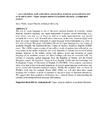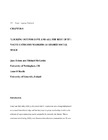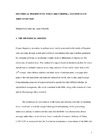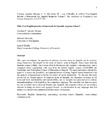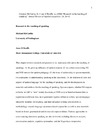Search
Now showing items 1-10 of 13
Competencies explored and exposed: Grammar, lexis, communication and the notion of levels
(Universitätsverlag Winter Heidelberg, 2012)
Post-colonialism, multi-culturalism, structuralism, feminism, post-modernism and so on so forth’ – vague language in academic discourse, a comparative analysis of form, function and context (Pre-published version)
(John Benjamins, 2008)
The use of vague language is one of the most common features of everyday spoken English. Speakers regularly use vague expressions to project shared knowledge (e.g., pens, books, and that sort of thing) as well as to make ...
What's in a name? - vocatives in casual conversations and radio phone-in calls
(Amsterdam: Rodopi, 2003)
This paper looks at the use of vocatives across two corpora: the 5-million word Cambridge
and Nottingham Corpus of Discourse in English (CANCODE) and a 55,000-word
corpus of radio phone-in calls. 100 vocatives are sampled ...
Looking out for love and all the rest of it: vague category markers as shared social space (Pre-published version)
(Basingstoke: Palgrave, 2007)
Analyzing spoken corpora (Pre-published version)
(Wiley-Blackwell, 2012)
Can English provide a framework for Spanish response tokens? (Pre-published version)
(Springer, Dordrecht, 2013)
This paper investigates the question of whether response items in Spanish can be analysed using frameworks developed for the study of similar items in English. Data comes from the Spanish corpus COREC, the Corpus Oral de ...
Research in the teaching of speaking (Pre-published version)
(Cambridge University Press: Cambridge Journals, 2004)
From language as system to language as discourse (Pre-published version)
(Routledge, 2019)
Corpora and the study of spoken language (Pre-published version)
(Mouton de Gruyter, 2008)
Spoken corpora have evolved over the 40 last four decades from early attempts at corpus-building for the purposes of better understanding such phenomena as first-language acquisition, social variation and conversational ...



